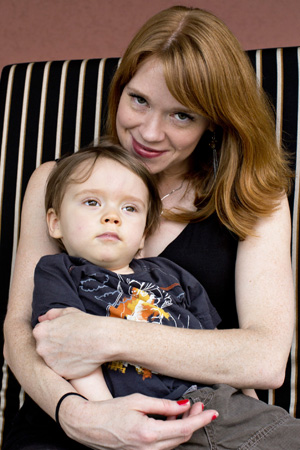Driving home from work one night this week, the weak winter daylight already gone, the whir of lights lining the traffic lanes to my left and right, the tops of the distant mountains growing purplish, darkening quickly, I listened to a story on NPR about palliative care in Queens.
The patient being interviewed, a Vietnam veteran who received a terminal cancer diagnosis after recovering from a near-fatal decade of alcoholism, talked about how wonderfully the hospice nurses were treating him. He felt, he said, “like gold.” He sounded both mystified and grateful, at the end of his life, to be cared for, to be treated as singular and precious.
I thought instantly of my son Ronan’s hospice nurse, her voice that carried across the house, her bright clothing, this woman who had lost a child herself in an accident years before, and who stood in my kitchen after I laid the body of my son in his crib, in his shroud, after he died, and said, “I’m so sorry.” Her presence was calm and efficient and subdued.

Emily and Ronan.
As the man on the radio talked about his limited time, his numbered days, I thought of Ronan’s hair, golden-red, of the gold flecks that scattered the green in his eyes, the way we carefully shifted him from his bed to his padded chair several times during each day, his body still alive, yet so fragile, already insubstantial, already leaving. I thought of the half moons of skin under his eyes after he died, how
quickly they darkened, how the air around the crib where he lay felt both energized and snuffed out, like the smoke from a candle, an intimate, hot ribbon of a presence, a time, a moment, that had passed. His father leaned over him, his face a series of lines, all care and kindness between the two of us gone. We were two people, locked in private cells of our own grief and unspoken angers. The boy and the world as we knew it had disappeared in a single final breath.
On the road, the lights of the cars on either side of me blurred a bit; the sky dropped lower, a deeper darkness. A massive truck passed me and honked. I was going too slowly, distracted by thought. “You know,” the man said. “At first I was upset about my diagnosis, but now I’ve come to terms with it.” The NPR reporter said something meant to be a wrap up, and then instrumental music – not too maudlin, not too peppy, deliberately chosen – marked the gap between this news segment and the next.
I turned off the radio and pressed the accelerator, wanting speed. What does it mean to come to terms with one’s death or the death of another? In A Grief Observed, a classical text in the canon of grief literature, C.S. Lewis mourns his late wife: “She died. She is dead. Is the word so difficult to learn?” The terms of his loss are invisible, irrevocable, irrefutable, and yet the feeling of the loss is chewable, he keeps swallowing, he feels afraid, he feels her absence as if it were a presence. He feels a miserable confusion.
What are the “terms” we come to? It sounds like a litigation or negotiation where there is neither. We, the grieving, are left with sorrow and time, mysterious nouns that are actually questions with no answers. No rhetoric is adequate to unpack them. No philosopher can quantify or subdue them. No religious leader can apply the correct salve. Each time the person’s passing re-passes – a date in the calendar, a time on the clock, those tiny, brutal anniversaries of the moment when sorrow and time were fused. A closing, a seal, a line in the sand. The sensory deprivation is all that’s left, and it is insufficient, and yet we cling to it. As if it were gold, the most precious thing.
I have a daughter now, and a husband I love more than I thought possible, and together they make sounds in the house that announce their presence. Charlotte babbles and crawls; Kent and I talk to her and to each other on these long winter mornings when the roads are impassable and the sky is packed with white snow falling in every direction, obscuring the hills, the sky. Locked in our domestic cave.
Related
It is now, in this time of renewed presence, that Ronan is haunting me in a friendly way. The music box my godparents gave to him, that I couldn’t bear to listen to when he was alive and have never wound, has been spontaneously bursting into song at night with Randy Newman’s “You’ve Got a Friend in Me.” Such a sweet, boy-ish song, which is why I could never listen to the box before. Now, when it wakes me up at two in the morning, I feel comforted, but also hallowed and knocked back into sadness, swept into a time before his final moment. A song is a presence, filled out, with shape, with sound, and when the music stops, so does that presence. And I come to terms all over again.
The music box woke me once from a recurring dream. In the world of this dream, thick with the feeling of dread, Ronan is still alive, and I am horrified – he can’t still be living, he’s too sick, this can’t still be happening. When I wake up, I’m briefly elated believing that he might be alive, there is his song! And then I realize, No, he is dead. The living baby next to me stirs. I climb into my day, with its terms: Grading, diapers, laundry, emails, words.
Just before Ronan died, I had another dream that often recurred in which he is running, long reddish-blond hair tumbling down his back, to the edge of a river. My grandmother is there, wearing a simple gray dress. She looks tiny and conservative but fun, smiling and standing next to my enormous Irish grandfather, his wild red hair wet from a swim. Kent’s mom is there, looking model-gorgeous, wearing a 50s white bikini and red lipstick, hair in loose rolls. My friend Kate’s father Dan is there, wearing a Red Sox cap and a slightly too-tight Speedo. Elliott is there, my friend Becky’s daughter, Charlotte’s namesake, who died the year before Ronan of the same medieval disease. She is splashing in the water, free in her body here, in this strange version of the afterlife, as she never was in life. All wait for Ronan on the other side of a shimmery curtain of water, their pants rolled up as if they’ve jumped in for a swim after a picnic. The light is golden and dusk-ish, leaves falling through the haze, moisture and summer in the air. I am handing Ronan through that veil of water, even though my body is nowhere in the dream and he doesn’t turn to look at me. Terms of his new life, perhaps.
So these are the terms I come to, made of the fragments of wishes and dreams, a list of less complicated nouns, the debris and ash of memory and longing: Golden-green eyes, light against water in the sunlight, a wet leaf stuck to a tree, a body too thin to live, an embroidered shroud with his name – Ronan, the sound of relieved laughter after a long struggle, gold.
Emily Rapp Black is the author of Poster Child: A Memoir, and The Still Point of the Turning World, which was a New York Times bestseller. She lives in New Mexico with the writer/editor Kent Black and their daughter.










